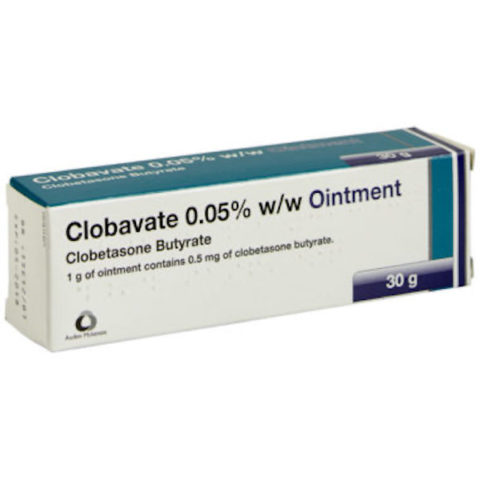*Brands may vary. please contact us for specific brands.
Clobetasone 0.05% Cream/Ointment
£16.29 – £28.89
- Relieves Flare-Ups Of Eczema And Dermatitis
- Soothes Itchy, Red, Dry Skin
- Active Ingredients: Clobetasone
- Buy With Confidence From UK Registered Pharmacy
- Includes Free Prescription
Clobetasone helps reduce the redness and itchiness of certain skin problems. It is used for mild skin problems or to keep your skin problem under control. These skin problems include eczema, dermatitis, nappy rash or insect bites.
Click Here To Complete Consultation
Buy more and save!
| Quantity | 1 | 2 | 3 |
|---|---|---|---|
| Price (each) | £16.29 – £28.89 | £14.66 – £26.00 | £13.03 – £23.11 |
| Options | Price | Stock |
|---|---|---|
| 30g | Cream | £16.29 | Out of Stock |
| 30g | Ointment | £16.29 | Out of Stock |
| 100g | Cream | £28.89 | Out of Stock |
| 100g | Ointment | £28.89 | Out of Stock |

Discreet Packaging

UK Based
-
What Clobetasone is and what it is used for
Clobetasone belongs to a group of medicines called steroids. It helps to reduce swelling and irritation. Clobetasone is used to: • help reduce the redness and itchiness of certain skin problems. It is used for mild skin problems or to keep your skin problem under control. These skin problems include eczema, dermatitis, nappy rash or insect bites. • help reduce inflammation of the outer ear.Before you use Clobetasone Ointment
Do not use: • if you are allergic to clobetasone butyrate or any of the other ingredients of this medicine • to treat any of the following skin problems, it could make them worse: - infected skin (unless the infection is being treated with an anti-infective medicine at the same time) - acne - severe flushing of skin on and around your nose (rosacea) - itchy skin which is not inflamed Do not use if any of the above apply to you. If you are not sure, talk to your doctor or pharmacist before using Clobetasone.How to use Clobetasone Ointment
Always use this medicine exactly as your doctor has told you. Check with your doctor or pharmacist if you are not sure. You usually apply Clobetasone up to 2 times a day. This may be reduced as your skin begins to get better. • This ointment is for use on your skin only. • Do not use on large areas of the body for a long time (such as every day for many weeks or months) - unless your doctor tells you to. • If you are using an emollient (moisturising) preparation allow time for Eumovate to be absorbed after each application before applying the emollient. • If you are applying the ointment on someone else make sure you wash your hands after use or wear disposable plastic gloves. • If your skin problem does not improve after 4 weeks, talk to your doctor.Clobetasone Cream Ingredients
• The active ingredient is clobetasone butyrate. Each 1 g contains 0.5 mg of clobetasone butyrate (0.05% w/w). • The other ingredients are liquid paraffin and white soft paraffin. See our other skin treatments see more information on Eczema. -
Side Effects
Stop using Clobetasone and tell your doctor immediately if:
• you find that your skin condition gets worse, you develop a generalised rash or your skin becomes swollen during treatment. You may be allergic to the ointment, have an infection or need other treatment.
• you have psoriasis and get raised bumps with pus under the skin. This can happen during or after treatment and is known as pustular psoriasis.
Other side effects you may notice when using Eumovate include:
Very rare (may affect up to 1 in 10,000 people)
• an increased risk of skin infection
• an allergic skin reaction where the ointment is applied
• a feeling of burning, irritation or itching where the ointment is applied
• rash, itchy bumpy skin or redness of the skin
• increased hair growth and changes in skin colour
• thinning of your skin and it may also damage more easily
• weight gain, rounding of the face
• delayed weight gain or slowing of growth in children
• bones can become thin, weak and break easily
• cloudy lens in the eye (cataract) or increased pressure in eye (glaucoma)
• increased blood sugar levels or sugar in the urine
• high blood pressure
Not Known (frequency cannot be estimated from the available data)
• blurred vision -
Eczema
Atopic eczema causes the skin to become itchy, dry, cracked and sore.
Some people only have small patches of dry skin, but others may experience widespread inflamed skin all over the body.
Inflamed skin can become red on lighter skin, and darker brown, purple or grey on darker skin. This can also be more difficult to see on darker skin.
Although atopic eczema can affect any part of the body, it most often affects the hands, insides of the elbows, backs of the knees and the face and scalp in children.
People with atopic eczema usually have periods when symptoms are less noticeable, as well as periods when symptoms become more severe (flare-ups).
The exact cause of atopic eczema is unknown, but it’s clear it is not down to one single thing.
Atopic eczema often occurs in people who get allergies. “Atopic” means sensitivity to allergens.
It can run in families, and often develops alongside other conditions, such as asthma and hay fever.
The symptoms of atopic eczema often have certain triggers, such as soaps, detergents, stress and the weather.
Sometimes food allergies can play a part, especially in young children with severe eczema.
You may be asked to keep a food diary to try to determine whether a specific food makes your symptoms worse.
Allergy tests are not usually needed, although they’re sometimes helpful in identifying whether a food allergy may be triggering symptoms.
-
Further Information













